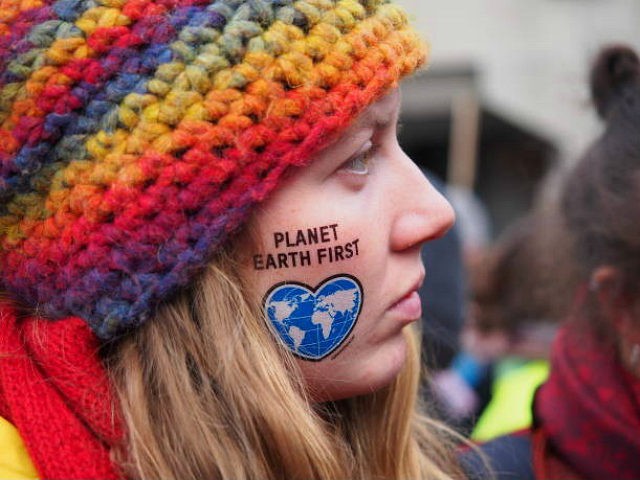The United Nations General Assembly adopted a resolution on Wednesday requesting that the International Court of Justice (ICJ) offer the world guidelines on what legal responsibilities countries have to fight “climate change.”
The ICJ is the United Nations’ top judicial body. It only takes cases between state actors, meaning countries can be parties to suits and participate in trials, but individuals and corporations cannot. It has no enforcement mechanism, so those implicated in its rulings often simply ignore its existence; for example, the ICJ ruled in March 2022 that Russia needed to immediately end its full-scale invasion of Ukraine.
Despite this, the ICJ has the power to adjudicate cases of international law, and its rulings are considered of academic merit, potentially later used as expert authority by interested parties, and what the United Nations described on Wednesday as “moral weight.” In this case, rather than hosting a trial and presiding over an adversarial proceeding, the U.N. General Assembly formally requested that the ICJ issue a clarifying document explaining how currently existing international law obligates state actors to take actions that promote the global governance institution’s climate agenda.
The United Nations reported that more than 130 countries “unanimously” adopted the resolution asking for ICJ intervention on Wednesday. Vanuatu, a Pacific Island nation whose leaders say is on the verge of total destruction as a result of the alleged climate crisis, championed the resolution as a way to elevate climate issues to the top of the agenda of larger countries:
BREAKING: #UNGA unanimously adopts landmark resolution requesting legal clarification from the @CIJ_ICJ on the obligations of States on the impact of #climatechange.
"Now is the time for climate action and climate justice," UN Secretary-General @antonioguterres says. pic.twitter.com/bfAlqNei1i
— UN News (@UN_News_Centre) March 29, 2023
U.N. Secretary-General Antonio Guterres enthusiastically supported the measure, endorsing it before the overwhelmingly supportive vote.
“For some countries, climate threats are a death sentence. Indeed, it is the initiative of those countries, joined by so many others – along with the efforts of young people all over the world – that brings us together,” Guterres said.
“Advisory opinions of the Court – the principal judicial organ of the United Nations – have tremendous importance and can have a long-standing impact on the international legal order,” he explained, adding:
Advisory opinions can provide much-needed clarification on existing international legal obligations. If and when given, such an opinion would assist the General Assembly, the UN and Member States to take the bolder and stronger climate action that our world so desperately needs.
Following the vote, Prime Minister Ishmael Kalsakau of Vanuatu called it a victory “of epic proportions” for the climate movement.
“Today’s historic resolution is the beginning of a new era in multilateral climate cooperation, one that is more fully focused on upholding the rule of international law and an era that places human rights and intergenerational equity at the forefront of climate decision-making,” he said in a statement.
Christopher Bartlett, climate diplomacy manager for the government of Vanuatu, told the U.K. Guardian that his government feels that, despite the nonbinding nature of the ICJ, if the court interprets already existing international law as creating climate obligations, that interpretation would be “immediately applicable to states,” giving the government hope of enforcement. If so, countries could sue one another at the ICJ for not sufficiently acting in the face of climate change.
While the General Assembly approved the measure overwhelmingly, voices of dissent did emerge. Speaking to the Agence France-Presse (AFP), international law specialist Benoit Mayer suggested that the ICJ could weigh in in a way that was “clear and precise but contrary to what the supporters of the request wanted” – meaning that it could potentially find no obligation in the existing body of international law for countries to take action against the “climate crisis.”
The administration of leftist President Joe Biden also dissented from the near-universal praise, emphasizing, however, its commitment to the “climate crisis.”
“Addressing the climate crisis is of the highest priority for the United States, both at home and abroad. In this context, the United States reaffirms our fundamental view that diplomacy is the best pathway to achieving our shared climate goals,” American U.N. representative Nicholas Hill said, claiming that Biden “has put the climate crisis at the center of our foreign policy and diplomacy.”
“However, we have serious concerns that this process could complicate our collective efforts and will not bring us closer to achieving these shared goals,” Hill’s statement to the U.N. continued. “We believe that launching a judicial process – especially given the broad scope of the questions – will likely accentuate disagreements and not be conducive to advancing ongoing diplomatic and negotiations processes.”
Hill concluded with a resigned statement that the resolution would pass regardless of Washington’s opinion of it.

COMMENTS
Please let us know if you're having issues with commenting.